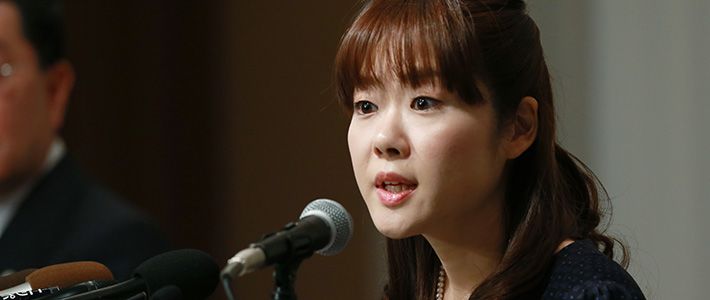
After Riken Confirms Misconduct in STAP Cell Papers, Obokata Haruko Fights Back
Science Technology Society- English
- 日本語
- 简体字
- 繁體字
- Français
- Español
- العربية
- Русский
Retraction of Papers Recommended
Earlier this year, the government-funded Riken scientific research institute set up a Research Paper Investigative Committee to investigate alleged improprieties in the publication of two papers on STAP (stimulus-triggered acquisition of pluripotency) cells. The papers were published in January by a team of researchers from the Riken Center for Developmental Biology in Kobe, led by Obokata Haruko. On April 1, the committee announced its findings. At a press conference also attended by Riken President and Nobel Prize–winning chemist Noyori Ryōji, the committee declared that of the six allegations of misconduct leveled at the group, including the falsification of data and the doctoring of images, there were two counts on which Obokata was conclusively at fault.
In a statement by Noyori, Riken signaled it would recommend retraction of one of the papers, but also stated that it would await the conclusions of a series of repeat experiments scheduled to be carried out at the institute before ruling conclusively on the existence of the STAP phenomenon.
The two papers on STAP cells were published in the British Journal Nature on January 30, shortly after the Riken team announced its findings. In them Obokata and her team of researchers asserted that they had successfully manufactured developmentally versatile stem cells by applying stress to cells taken from infant mouse tissues, including steeping them in a mildly acidic solution. These assertions astonished many in the world of cell biology, seeming as they did to revolutionize the field of stem cell research. But the lack of any experiments reproducing these results in other laboratories led people in various quarters to raise doubts about the findings.
Two Instances of Misconduct Confirmed
The investigation committee confirmed two of the six allegations leveled at the team to be clear examples of misconduct. The first concerned photographs from the paper purporting to show differentiated tissues grown from STAP cells, which had apparently been duplicated from Obokata’s own doctoral thesis. The second allegation concerned images of DNA fragments, which appeared to be composite photos.
Regarding the other four allegations, namely, (1) descriptions in the papers of experimental technique seemed to closely resemble passages from a paper published by an overseas institution; (2) other descriptions of experimental technique were alleged to differ from the procedures actually used in the research; (3) some images of STAP cells presented in the research appeared to show unnatural distortions; and (4) images of placental cells claimed to come from different experiments seemed to strongly resemble one another, the committee found no conclusive evidence of malpractice.
The two proven counts of misconduct were found by the committee to be Obokata’s responsibility. While the paper’s coauthors, including Deputy Director Sasai Yoshiki of the Center for Developmental Biology and Professor Wakayama Teruhiko of the University of Yamanashi, were found not to be personally guilty of any misconduct, the committee noted that—especially considering their position and experience—they “bear heavy responsibility for the research misconduct” resulting from their failure to verify the accuracy of the data before submitting the papers to Nature.
Obokata Pushes Back
Obokata responded to Riken’s findings on April 8 with a formal appeal against the committee’s report. In this appeal she stated that her actions, which under ordinary circumstances would have been classified as innocent mistakes according to Riken’s own code of conduct, had been unfairly and unilaterally declared to be fabrication or falsification of data. She also strongly objected to the idea that the very discovery of STAP cells will be dismissed as a fabrication based on the committee’s conclusions.
On April 9, she held a press conference in Osaka, her first public appearance since late January. In her statement, she apologized for the inattention to detail and inexperience that had caused the problems in her team’s papers. She stressed, though, that the nature of these problems did not merit the harsh judgment reached by the committee, and insisted that her STAP cell findings were facts she had confirmed carefully. In her answers to reporters’ questions, she claimed that she had successfully created STAP cells with her technique more than 200 times; that she had additional lab journals detailing her experiments (only two were submitted to Riken as part of the publication process); and that she remained dedicated to this area of research, which she said—with her only smile of the day—she would be willing to carry out at any institution that would give her the chance.
Riken has accepted her appeal and has stated that it will be processed according to the organization’s internal rules. The STAP cell flap is far from over, but the entire episode has already sent shockwaves in many directions, with observers now sounding the alarm over young researchers with unethical approaches to their work and institutions that are excessively focused on highly public results. With some also now expressing fears that the rest of the world will lose faith in scientific research conducted here in Japan, it is clear that the issues raised by this case will resonate for some time.
(Originally written in Japanese on April 3; updated in English on April 9. Banner photo: Obokata Haruko addresses the press in her first public appearance in over two months, claiming the problems in her team’s papers were innocent mistakes and not calculated falsification of data. © Jiji Press.)
Related Tags
RIKEN science research scandal STAP misconduct investigation stem cell Obokata Haruko
